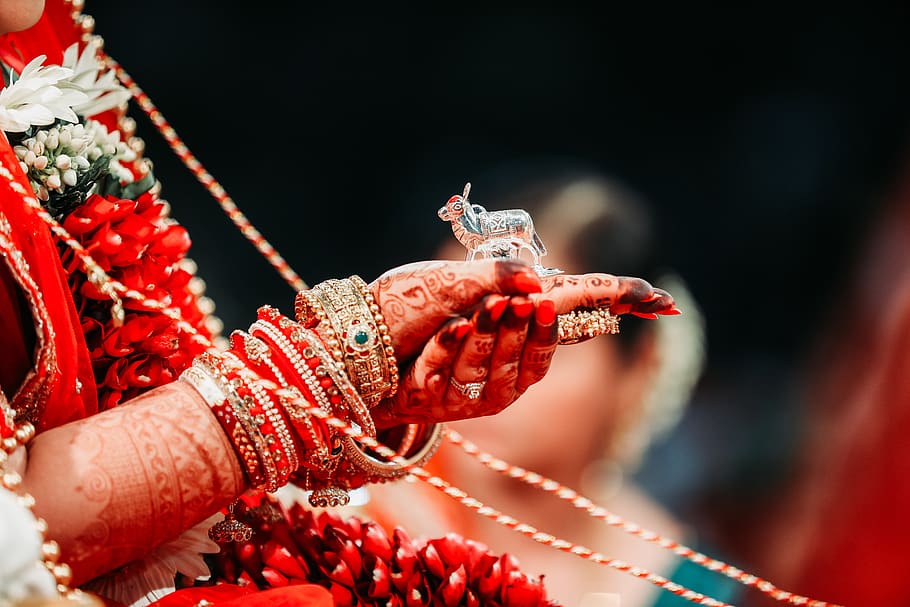Table of Contents
Introduction
In the tapestry of North Indian Hindu weddings, pre-wedding rituals are the colorful threads that weave together tradition, culture, and anticipation. These rituals, steeped in cultural significance and heartfelt symbolism, set the stage for the grand celebration of love and union. In this comprehensive guide, we will explore the enchanting world of pre-wedding ceremonies in North Indian Hindu weddings, drawing insights from both tradition and contemporary practices.
Roka Ceremony: The Formal Start
The journey commences with the Roka ceremony, a formal announcement of the impending union. It’s a moment when families exchange blessings, gifts, and well-wishes, sealing the bond between two families.
Sagai (Engagement): The Exchange of Rings
The Sagai, or engagement ceremony, is a significant event where the couple exchanges rings. It’s a joyous occasion celebrated with music, dance, and elaborate decorations.
Mehndi Ceremony: Artistry and Tradition
The Mehndi ceremony is a vibrant and artistic celebration where intricate henna designs are applied to the bride’s hands and feet. It’s not only a beautifying ritual but also a symbol of love and prosperity.
Sangeet Ceremony: Music and Dance Extravaganza
The Sangeet ceremony is a night of music and dance, where both families come together to celebrate. It’s a lively event filled with performances by family members, showcasing their enthusiasm and talent.
Haldi Ceremony: Blessings and Tradition
The Haldi ceremony is a purifying and beautifying ritual. A paste of turmeric, oil, and water is applied to the bride and groom’s skin, giving them a radiant glow for the wedding day. It’s also believed to ward off evil spirits and bless the couple with good luck.
Tilak Ceremony: A Symbol of Acceptance
The Tilak ceremony involves the application of a tilak (sacred mark) on the groom’s forehead by the bride’s father or brother. It signifies the formal acceptance of the groom into the bride’s family and the promise of his commitment.
Choora Ceremony: Red and White Bangles
In some North Indian communities, the bride performs the Choora ceremony, where her maternal uncle gifts her a set of red and white bangles. These bangles are worn for a specific period and are believed to bring good luck.
Janev Ceremony: Sacred Thread of Responsibility
The Janev or Yajnopavit ceremony involves the groom wearing the sacred thread. It’s a symbol of spiritual and moral responsibility, marking his transition to the next stage of life as a married man.
Sehrabandi: Tying the Sehra
Sehrabandi is a tradition where the groom’s relatives tie a sehra (a veil of flowers and ornaments) to his head. This ceremony signifies his readiness to take on the responsibilities of marriage.
Gauri Pooja: Seeking Marital Bliss
In some communities, the bride performs the Gauri Pooja, a ritual where she prays to Goddess Gauri for marital bliss and happiness. This ritual is usually held a day before the wedding.
Conclusion
These pre-wedding rituals in North Indian Hindu weddings form a rich tapestry of tradition, culture, and love. They serve as a bridge between the past and the future, connecting families and ushering in a new chapter of togetherness. These rituals, with their deep cultural significance, add depth and beauty to the wedding festivities, making them an integral and cherished part of the North Indian Hindu wedding experience.
FAQs:
1. What is the significance of the Roka ceremony?
- Answer: The Roka ceremony is a formal announcement of the impending union, signifying the families’ acceptance of the relationship. It marks the beginning of wedding preparations and the exchange of blessings and gifts.
2. What does the Mehndi ceremony symbolize?
- Answer: The Mehndi ceremony is not only an artistic tradition but also symbolizes love, prosperity, and the strengthening of the couple’s bond. The intricate henna designs are believed to bring good luck.
3. Why is the Haldi ceremony performed?
- Answer: The Haldi ceremony involves applying a paste of turmeric, oil, and water to the bride and groom’s skin. It is believed to purify and bless them, ward off evil spirits, and give them a radiant glow for the wedding day.
4. What is the importance of the Sangeet ceremony?
- Answer: The Sangeet ceremony is a celebration of music and dance. It brings both families together and showcases their enthusiasm and talent. It’s a joyful event that adds to the festive spirit of the wedding.
5. Are these pre-wedding rituals mandatory in all North Indian Hindu weddings?
- Answer: While many North Indian Hindu weddings incorporate these rituals, the extent and specific rituals may vary based on cultural and regional differences. Some families may choose to perform only select rituals.
6. Can non-Hindu individuals participate in these rituals?
- Answer: Pre-wedding rituals are often inclusive, and family and friends from various backgrounds are welcome to participate. It reflects the spirit of unity and togetherness during the wedding celebrations.
7. Is there a specific order in which these rituals are performed?
- Answer: The order of pre-wedding rituals may vary from one wedding to another. However, the Roka ceremony, followed by the Sagai, Mehndi, and other customs, is a common sequence.
8. How long do pre-wedding rituals typically last?
- Answer: The duration of these rituals can vary. Some may be completed in a day, while others, like the Mehndi and Sangeet ceremonies, can span several hours or even an entire day of celebrations.
9. What is the best way to learn more about these rituals and their cultural significance?
- Answer: To gain a deeper understanding of these rituals and their cultural significance, you can consult cultural websites, attend cultural events, or seek guidance from knowledgeable individuals within the community.
10. Are these rituals performed in other regions of India as well? –
Answer: While these pre-wedding rituals are common in North Indian Hindu weddings, other regions of India have their own unique pre-wedding customs and traditions that may differ in form and significance.



